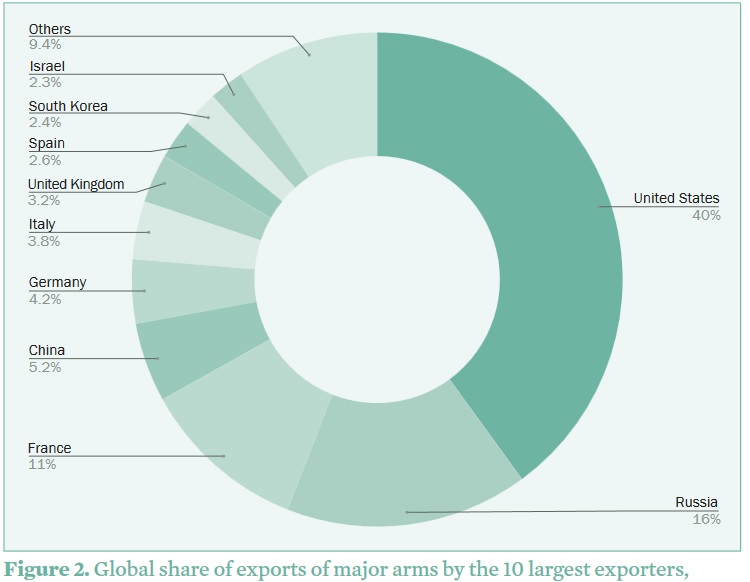The Stockholm International Peace Research Institute (SIPRI) released a new report on the global arms trade on Monday (13).
According to the data provided, the volume of international transfers in the period between 2018 and 2022 was 5.1 per cent lower than in 2013-2017, but 4.8 per cent higher than between 2008 and 2012.
The five largest arms exporters were the United States, Russia, France, China and Germany, which together account for 76 per cent of global arms exports over the past four years.
Comparing the 2018-22 five-year period with the previous one, US arms exports rose from 33 per cent to 40 per cent of the global total, doubling its sales to Europe, while France increased its share of the macabre item from 7.1 per cent to 11 per cent, supplying heavy weaponry to 62 countries, its pre-eminent buyers being India, Egypt and Qatar.
Over the same period, Russian exports fell by 31 per cent (from 22 to 16 per cent of the total), probably due to the priority given to domestic supplies. Chinese exports fell by 23 per cent and those from Germany by 35 per cent, together accounting for 10 per cent of the world volume.
On the other hand, the report notes that the five largest importers in 2018-22 were India, Saudi Arabia, Qatar, Australia and China, who together received 36 per cent of the global total.
Arms imports from European NATO states increased by 65 per cent, while Ukraine became the 3rd largest arms importer in 2022, after Qatar and India.
In regional terms, the SIPRI communiqué notes, arms imports spilled out in Africa (-40%), the Americas (-21%), the Middle East (-8.8%), Asia and Oceania (-7.5%), if some states such as Japan, South Korea and Australia increased their purchases considerably.
Arms perversity continues unabated
Arms sales, although slightly lower than in the previous five-year period, have recovered to previous levels, driven by the increase in global military tension. This scenario is primarily driven by the US’s determination not to give in to the advance of a multipolar world and to force the disciplining, mainly of European states, under its orbit.
The provocations provoked by NATO’s expansion towards Russia’s borders, the continued interference in neighbouring states such as Belarus, Kazakhstan and now Georgia – with the precedent of the Ukrainian Maidan – and the open threats to expand the war into Asia, heightened by the formation of the AUKUS bloc (Australia, the UK and the US) have only created a pre-war world atmosphere, creating an unmistakable sense of imminent danger, which triggers rearmament.
The war in Ukraine has changed the flow of arms, serving – like any war – the interests of the big arms manufacturers. It should be noted that many of the weapons supplied to Ukraine by the US and European countries come from pre-existing stockpiles, which has meant new requests to replenish stocks.
While the fighting in the hard-hit Middle East seems to be (finally!) reaching a point of possible decline with the major agreements reached between Saudi Arabia and Iran and the US withdrawal from Afghanistan (though not Syria), the Saudis, Qatar and Egypt have sharply increased their arms supply, while in the period 2018-2022 Iranian imports have been virtually zero, probably because of replacement by home production.
Meanwhile, the decline in arms purchases from African countries is good news. The decrease in imports from Algeria (-58%) and Morocco (-30%) weighed heavily here, according to the report. On this continent, Russian exports have taken precedence with 40% of African imports of large arms, displacing the United States (16%), China (9.8%) and France (7.6%), China (9.8%) and France (7.6%).
The anti-war stance of the Latin American and Caribbean countries, which refused to be dragged into the US insistence on supplying arms to Ukraine, has been remarkable.
In short, the still gigantic volume of arms trade shows us that the vast majority of humanity continues to be hostage to a perverse system that privileges profit and power at any cost over human life.






